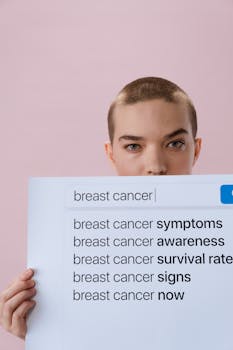
**
Colon Cancer on the Rise: 7 Warning Signs You Shouldn't Ignore
Colon cancer, a disease affecting the large intestine (colon), is experiencing a concerning upward trend, particularly among younger adults. While it's often associated with older populations, the rising incidence rate necessitates increased awareness and proactive screening. Understanding the risk factors and recognizing the warning signs are crucial for early detection and improved treatment outcomes. This article delves into the alarming rise in colon cancer cases and highlights seven key symptoms you shouldn't overlook.
The Alarming Increase in Colon Cancer Cases: A Growing Public Health Concern
Recent studies paint a worrying picture. Statistics reveal a significant increase in colon cancer diagnoses, especially in individuals under 50. This shift necessitates a reevaluation of traditional screening guidelines and a heightened focus on preventative measures. Several factors contribute to this concerning trend:
- Changes in Diet and Lifestyle: The modern Western diet, often high in processed foods, red meat, and saturated fats, is strongly linked to an increased risk. A sedentary lifestyle, lack of physical activity, and obesity further exacerbate the problem.
- Genetic Predisposition: Family history of colon cancer significantly increases an individual's risk. Inherited genetic mutations, such as Lynch syndrome and familial adenomatous polyposis (FAP), predispose individuals to developing the disease.
- Inflammatory Bowel Disease (IBD): Chronic conditions like ulcerative colitis and Crohn's disease increase the long-term risk of colon cancer. Regular monitoring and close medical supervision are vital for individuals with IBD.
- Lack of Screening: Insufficient screening rates remain a major issue. Regular colonoscopies are crucial for early detection and removal of precancerous polyps, preventing the development of colon cancer.
These factors, combined with aging populations, contribute to the alarming rise in colon cancer cases globally. Early detection is paramount for successful treatment, making it crucial to be aware of the potential warning signs.
7 Warning Signs of Colon Cancer: Don't Delay Seeking Medical Attention
While many people with colon cancer experience no symptoms in the early stages, recognizing potential warning signs can be life-saving. If you experience any of the following, it's crucial to consult your doctor immediately:
Changes in Bowel Habits: This is perhaps the most common symptom. Persistent diarrhea, constipation, or a change in the consistency or frequency of your bowel movements should not be ignored. A persistent feeling of needing to have a bowel movement, even after doing so, can also be indicative of a problem.
Rectal Bleeding: Blood in your stool, even if only a small amount, warrants immediate medical attention. This could range from bright red blood to dark, tarry stools, and is a significant cause for concern.
Persistent Abdominal Pain or Cramping: While occasional abdominal discomfort is normal, persistent, unexplained pain or cramping, particularly in the lower abdomen, should be investigated. The pain may be accompanied by bloating or gas.
Unexplained Weight Loss: Significant unintentional weight loss without any change in diet or exercise routine is a serious warning sign that requires medical evaluation.
Fatigue: Feeling unusually tired or fatigued, even after adequate rest, can be a symptom of colon cancer. This persistent tiredness can be a subtle but important indicator.
Weakness or Dizziness: These symptoms can be indicative of anemia, a common complication of colon cancer. Anemia is characterized by low red blood cell counts which can lead to weakness, dizziness, and shortness of breath.
Nausea and Vomiting: While not always indicative of colon cancer, persistent nausea and vomiting, especially when combined with other symptoms, should prompt a medical evaluation.
Understanding Colon Cancer Risk Factors: Taking Control of Your Health
Beyond the seven warning signs, understanding your risk factors is crucial in implementing preventative measures. Risk increases with:
- Age: The risk of colon cancer significantly increases after age 50.
- Family history: A family history of colon cancer, particularly in close relatives, greatly elevates your risk.
- Personal history of polyps: Having adenomatous polyps (precancerous growths) in the colon increases the likelihood of developing colon cancer.
- Inflammatory bowel disease (IBD): Individuals with IBD, such as ulcerative colitis or Crohn's disease, have a heightened risk.
Screening and Prevention: Protecting Yourself Against Colon Cancer
Regular screening is the most effective way to detect colon cancer early. Colonoscopy is the gold standard for screening, allowing for the detection and removal of precancerous polyps. Other screening options include sigmoidoscopy and stool tests. Discuss the best screening option for you with your healthcare provider.
Lifestyle modifications can also play a significant role in preventing colon cancer:
- Maintain a healthy diet: Focus on a diet rich in fruits, vegetables, and whole grains, and limit your intake of red and processed meats.
- Engage in regular physical activity: Aim for at least 150 minutes of moderate-intensity aerobic exercise per week.
- Maintain a healthy weight: Obesity increases the risk of colon cancer.
- Don't smoke: Smoking is linked to an increased risk of several types of cancer, including colon cancer.
Early Detection: The Key to Successful Treatment
Early detection of colon cancer dramatically improves treatment outcomes and survival rates. If you experience any of the warning signs mentioned above, don't delay seeking medical attention. Early diagnosis allows for less invasive treatment options, such as surgery, chemotherapy, or radiation therapy, resulting in a higher likelihood of a positive prognosis.
Disclaimer: This article is for informational purposes only and should not be considered medical advice. Always consult with a healthcare professional for any health concerns or before making any decisions related to your health or treatment.




















